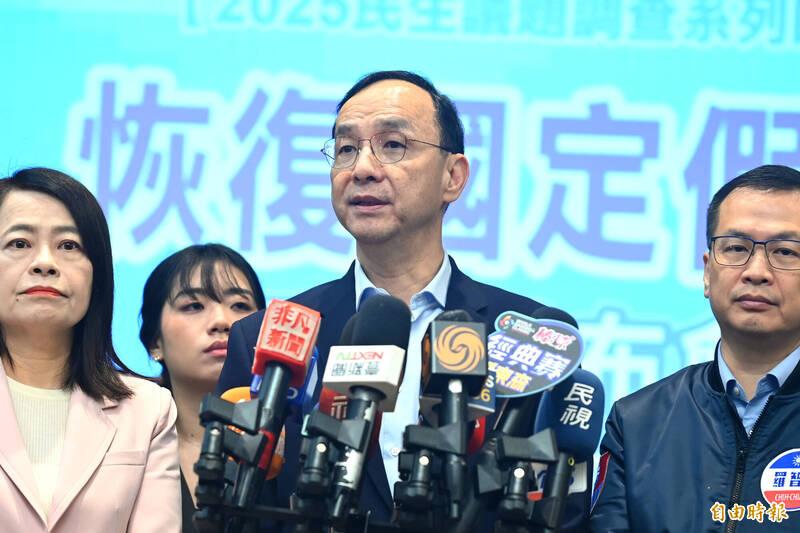The majority of respondents in a survey about Taiwan’s national holidays support reinstating seven former annual holidays, a Chinese Nationalist Party (KMT) think tank today told a news conference.
The KMT commissioned All Dimensions Public Research, Inc. to carry out the survey from Thursday until Saturday last week, collecting 1,068 effective samples with a margin of error of 3 percentage points.

Photo: Wang I-sung, Taipei Times
About 56.7 percent supported reinstating seven more annual holidays, which were removed in 2016, according to the poll.
About 66.3 percent were in favor of designating Labor Day as a public holiday, while 64.3 percent supported reinstating Teachers’ Day as a holiday, 64.1 percent for Retrocession Day on Oct. 25 which commemorates the end of Japanese occupation of Taiwan, and 65.4 percent for Constitution Day on Dec. 25.
The KMT has made restoring public holidays a priority bill in the upcoming legislative session of the Legislative Yuan.
The Legislative Yuan must closely examine the working hours and rest days of Taiwanese workers in this upcoming session, as Taiwan has become a “sweatshop island,” KMT Chairman Eric Chu (朱立倫) said.
Taiwanese workers are known to work hard, with fewer annual rest days than those in Asian neighbors, with 11 national holidays a year compared to 16 in Japan and South Korea, 17 in Hong Kong and 13 in China, he said.
Taiwan’s work hours are also the longest in Asia according to the Organisation for Economic Co-operation and Development (OECD) with the exception of Singapore, though wages between the two cannot compare, he added.
The seven national holidays were removed in 2016 as amendments to the Labor Standards Act (勞動基準法) that year required all workers to have two days off per week, one fixed and one flexible, meaning those seven holidays were cut to enable the change, the think tank said.
However, data from last year shows that Taiwanese work an average of 2,020 hours per year, the fifth-highest of 39 major countries surveyed, and amendments in recent years have not alleviated Taiwan’s chronic overwork problem, it added.
The National Federation of Teachers Unions and cross-party legislators last week also called for the government to designate Labor Day on May 1 and Teachers’ Day on Sept. 28 as official national holidays to align the number of rest days between the public and private sectors.
Premier Cho Jung-tai (卓榮泰) previously said that he hopes to create a nationwide standard for public holidays and find a solution that minimizes social disruption, calling for an open and rational discussion on the matter.

Taipei has once again made it to the top 100 in Oxford Economics’ Global Cities Index 2025 report, moving up five places from last year to 60. The annual index, which was published last month, evaluated 1,000 of the most populated metropolises based on five indices — economics, human capital, quality of life, environment and governance. New York maintained its top spot this year, placing first in the economics index thanks to the strength of its vibrant financial industry and economic stability. Taipei ranked 263rd in economics, 44th in human capital, 15th in quality of life, 284th for environment and 75th in governance,

Greenpeace yesterday said that it is to appeal a decision last month by the Taipei High Administrative Court to dismiss its 2021 lawsuit against the Ministry of Economic Affairs over “loose” regulations governing major corporate electricity consumers. The climate-related lawsuit — the first of its kind in Taiwan — sought to require the government to enforce higher green energy thresholds on major corporations to reduce emissions in light of climate change and an uptick in extreme weather. The suit, filed by Greenpeace East Asia, the Environmental Jurists Association and four individual plaintiffs, was dismissed on May 8 following four years of litigation. The

A former officer in China’s People’s Liberation Army (PLA) who witnessed the aftermath of the 1989 Tiananmen Square massacre has warned that Taiwan could face a similar fate if China attempts to unify the country by force. Li Xiaoming (李曉明), who was deployed to Beijing as a junior officer during the crackdown, said Taiwanese people should study the massacre carefully, because it offers a glimpse of what Beijing is willing to do to suppress dissent. “What happened in Tiananmen Square could happen in Taiwan too,” Li told CNA in a May 22 interview, ahead of the massacre’s 36th anniversary. “If Taiwanese students or

The New Taipei City Government would assist relatives of those killed or injured in last month’s car-ramming incident in Sansia District (三峽) to secure compensation, Mayor Hou You-yi (侯友宜) said yesterday, two days after the driver died in a hospital. “The city government will do its best to help the relatives of the car crash incident seek compensation,” Hou said. The mayor also said that the city’s Legal Affairs, Education and Social Welfare departments have established a joint mechanism to “provide coordinated assistance” to victims and their families. Three people were killed and 12 injured when a car plowed into schoolchildren and their